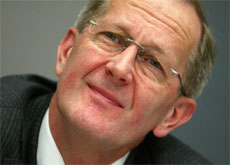Swiss and Russians sign trade agreement

Swiss Economics Minister Joseph Deiss tells swissinfo what the deal he has just signed with Russia means for Switzerland.
Switzerland and Russia on Friday successfully concluded bilateral negotiations on Moscow’s accession to the World Trade Organization (WTO).
The agreement leaves Russia needing only the backing of the United States, Australia and Colombia out of the WTO’s 149 member states to complete the country-by-country part of the accession process.
Deiss and his Russian counterpart, German Gref, signed the accord on the fringes of the World Economic Forum (WEF) annual meeting in Davos.
The deal will lead to lower Russian import duties, after a transition period, for Swiss chemical products, textiles, machinery and watches among other goods.
Russia, the largest economy still outside the Geneva-based WTO, will also grant more access to Swiss banking and insurance companies, although foreign firms will not be able to provide services through subsidiaries.
swissinfo: What does this treaty involve?
Joseph Deiss: Every country that wants to become a member of the WTO has to accept general rules of conduct. But it must also reach an agreement with each member state to settle bilateral issues.
As a result, Russia had to negotiate with Switzerland – negotiations which were often difficult since it involved getting rid of all remaining differences of opinion.
swissinfo: What were Switzerland’s specific demands?
J.D.: We started off with the usual subjects: property rights, counterfeiting – those are important issues for us.
We then discussed administrative issues. For example, Russia has very severe measures on watches for security reasons. But this is red tape that we need to cut.
swissinfo: Russia almost created a stumbling block in the form of last-minute demands on mad cow disease. Are you satisfied with the terms of the treaty?
J.D.: Yes, we’ve finally got a satisfactory result. A few points were still unresolved – there was a certain amount of toing and froing as is always the case when negotiating – but in the end we were able to agree on something.
swissinfo: Why is Switzerland one of the last four countries to endorse Russia’s accession?
J.D.: Switzerland is very much involved in international trade. Bearing this in mind, the complexity of certain issues has without doubt required more time.
It’s possible that the Russians decided on a specific order of negotiations – they still have to negotiate with the United States after all.
And maybe it was also important for them not to conclude a deal with us too quickly, given that we’re close to the US on many points – notably intellectual property.
swissinfo: How will Switzerland benefit from Russia’s joining the WTO?
J.D.: We are in favour of a multilateral system, but this multilateralism only works if there are members.
It is important for us that Russia joins because we don’t have any specific treaties with the Russians concerning free trade. With the European Union for example we have a set of accords.
But as for those countries with which we haven’t signed such agreements, their membership of the WTO already enables us to obtain all the benefits associated with the WTO.
swissinfo-interview: Pierre-François Besson in Davos
Economic relations between Switzerland and Russia are flourishing.
In 11 months in 2005 Switzerland exported to Russia the equivalent of SFr1.389 billion ($1.081 billion) – a 27% rise.
Switzerland imported SFr791 million worth of Russian goods (+2%).
Russia has been negotiating to join the 149-member global commerce body since 1993. It has had to embark on a major set of legislative reforms to fall in line with WTO rules, including producing a new customs code, to satisfy existing members, and has set a new target date of spring this year for joining.
Entry to the WTO requires the signing of bilateral deals with all states that demand them as well as negotiating directly with the global trade body to ensure that a candidate’s domestic commercial regulations conform to WTO rules.
Under WTO rules, each member has the right to seek its own trade deal with a candidate before approving that candidate’s membership.
The bilateral deals negotiated by individual members are eventually consolidated so that all members trade with the new member under the same conditions.

In compliance with the JTI standards
More: SWI swissinfo.ch certified by the Journalism Trust Initiative











You can find an overview of ongoing debates with our journalists here . Please join us!
If you want to start a conversation about a topic raised in this article or want to report factual errors, email us at english@swissinfo.ch.